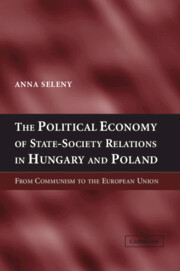 The Political Economy of State-Society Relations in Hungary and Poland
The Political Economy of State-Society Relations in Hungary and Poland Book contents
- Frontmatter
- Contents
- List of Tables
- List of Abbreviations
- Acknowledgments
- The Political Economy of State-Society Relations in Hungary and Poland
- Introduction: Points of Permeable Contact
- 1 History and Theory in Practice
- 2 Precocious Reformer: Hungary
- 3 Injustice: Poland 1948–1980
- 4 Poland: From Solidarity to 1989
- 5 Hungary: Property Relations Recast
- 6 Schumpeter by the Danube: From Second Economy to Private Sector
- 7 Action and Reaction: Institutional Consequences of Private-Sector Expansion
- Conclusion: Despotism, Discovery, and Surprise
- Index
6 - Schumpeter by the Danube: From Second Economy to Private Sector
Published online by Cambridge University Press: 23 November 2009
- Frontmatter
- Contents
- List of Tables
- List of Abbreviations
- Acknowledgments
- The Political Economy of State-Society Relations in Hungary and Poland
- Introduction: Points of Permeable Contact
- 1 History and Theory in Practice
- 2 Precocious Reformer: Hungary
- 3 Injustice: Poland 1948–1980
- 4 Poland: From Solidarity to 1989
- 5 Hungary: Property Relations Recast
- 6 Schumpeter by the Danube: From Second Economy to Private Sector
- 7 Action and Reaction: Institutional Consequences of Private-Sector Expansion
- Conclusion: Despotism, Discovery, and Surprise
- Index
Summary
The function of entrepreneurs is to reform or revolutionize the pattern of production.
Joseph A. SchumpeterThe socio-political ramifications of the 1982 property-rights reform, which institutionalized private entrepreneurship in Hungary's state-socialist system, were complex and profound. Pre-reform informal entrepreneurs, accustomed to an old set of rules, suddenly found themselves in a strange new world. They now operated in a hybrid economy in which enhanced legality and heightened competition was an irrevocable fact. Anyone doubting this had only to look at the new entrepreneurs who began to emerge into the light of day. Some – albeit a clear minority – were bold enough to leave the state sector entirely. Some even became legislators avant la lettre, lobbying and petitioning state bureaucracies to such a point that they forced the broadening of existing regulations and, in successive rounds, the enactment of new, more liberal ones. A few became so well-versed in the laws affecting them that they advised the state through the “representative” organizations that had originally been created to oversee and control the tiny pre-1982 private sector of craftsmen and shopkeepers. Still others set out to harness the politics of entrepreneurship, and founded an independent representative organization, the National Association of Entrepreneurs (VOSZ).
Like their informal predecessors in industry and services or their counterparts in agriculture, these new entrepreneurs began collectively to change their environment, even as they remained convinced that they were merely functioning as best they could within the confines of micro-universes carefully constructed to ward off outside interference.
- Type
- Chapter
- Information
- The Political Economy of State-Society Relations in Hungary and PolandFrom Communism to the European Union, pp. 161 - 204Publisher: Cambridge University PressPrint publication year: 2006


